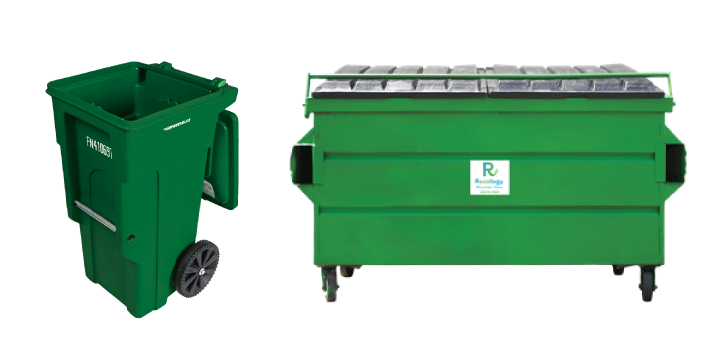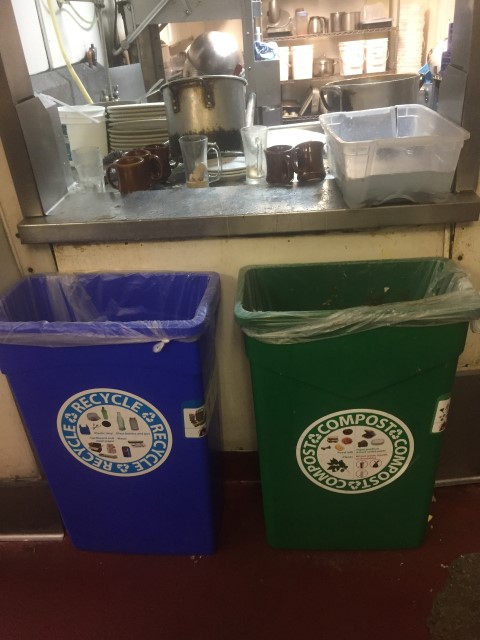All businesses, organizations, non-profits, and multi-family properties must do the following
 Subscribe to Recycling and Organics Recycling Collection Service: Businesses must either subscribe to and participate in the City’s recycling and organics curbside collection service OR self-haul recyclables and organic waste to a recycling or certified composting facility.
Subscribe to Recycling and Organics Recycling Collection Service: Businesses must either subscribe to and participate in the City’s recycling and organics curbside collection service OR self-haul recyclables and organic waste to a recycling or certified composting facility.
Cupertino has an exclusive contract with Recology Cupertino to service your carts and bins.
Depending on the amount of organic waste your business generates, you may need additional organics carts or more frequent service. Businesses that choose to self-haul their recycling and organics will need to meet certain criteria and certify with the City as a self-hauler on a regular basis.
Provide Adequate Access to Organics Recycling: Businesses must ensure they have adequate access to recycling and organics recycling service for their employees, contractors, customers and tenants, including supplying and allowing access to an adequate number, size and location of containers with either sufficient labeling or the appropriate color (more information on this is provided below).
 Provide Organic and Recycling Bins Next to Each Trash Bin: All businesses, except for multi-family properties, must provide organics and recycling bins next to each trash bin (except restrooms) for customers to use. Businesses may need to purchase additional bins in order to ensure that an organics and recycling bin is placed next to each trash can that customers can access. This applies to every trash can available to customers at a business—indoors and outdoors--unless there are no recyclables or organics generated in that area.
Provide Organic and Recycling Bins Next to Each Trash Bin: All businesses, except for multi-family properties, must provide organics and recycling bins next to each trash bin (except restrooms) for customers to use. Businesses may need to purchase additional bins in order to ensure that an organics and recycling bin is placed next to each trash can that customers can access. This applies to every trash can available to customers at a business—indoors and outdoors--unless there are no recyclables or organics generated in that area.
Remember: paper towels and facial tissue are considered “organic materials,” so businesses must ensure that there are sufficient organics bins to be able to collect all these and all other recyclable and organic wastes from employees, contractors, etc.
Exception: If a business has a trash bin in an area that does not generate any recycling or organic wastes, then it does not have to provide recycling and/or organics containers in that particular area. For example: A trash can in an examination room at a doctor’s office may not need a paper recycling bin if there is no paper waste generated in that room.
Make Sure Waste Bin Have Labels and Correct Colors: Waste bins provided by a business must conform to certain color or labeling requirements. Trash bins must be grey or black, recycling bins must be blue, and organics bins must be green, (with either the lid or the body of the waste bin being the correct color). Businesses do not need to replace existing containers until they are no longer functional, or until January 1, 2036, whichever comes first.
Provide Education and Sorting Outreach: Businesses are responsible for educating their employees, contactors, tenants, and customers on properly sorting organic materials into the correct containers. Regular outreach from businesses to employees, contractors, tenants, and customers is required in order to maintain an awareness of proper sorting. Businesses must prohibit their employees from placing organic waste and recyclables in the wrong bins.
Monitor for Contamination: Businesses are responsible for making sure that their trash, recycling, and organic waste is sorted properly by performing regular inspection of their trash, recycling, and organic waste bins for contamination, and reminding employees about proper sorting.
Provide Information to Tenants within Two Weeks: Businesses need to provide new residential and commercial tenants with information on how to properly sort waste within two weeks of them moving in and every year thereafter. Businesses shall annually provide information to tenants about recycling and organic waste diversion requirements and about the proper sorting of organic waste.